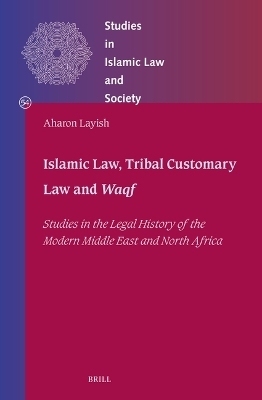
Islamic Law, Tribal Customary Law and Waqf
Brill (Verlag)
978-90-04-31405-4 (ISBN)
In this collected volume, Aharon Layish demonstrates that legal documents are an essential source for legal and social history. Since the late nineteenth century, Islamic law has undergone tremendous transformations, some of which have strongly affected the basic features of its nature.
The changes include the transformation of Islamic law from a jurists’ law to a statutory law; the abolishment of waqf; the Islamization of tribal customary law; the creation of Sudanese legal methodologies strongly inspired by Ṣūfī and Salafī traditions or Western law, and the emergence of an Israeli version of Islamic law.
Aharon Layish (1933-2022), Ph.D. (1973), Professor Emeritus of the Hebrew University of Jerusalem, has published extensively on modern trends in Islamic law with special reference to Israel; Islamization of tribal customary law in Libya and the Judean Desert; Muslim and Druze waqf and testamentary waqf; marriage, divorce, and succession in the Muslim and Druze family; the Mahdī’s legal methodology; and reinstatement of Islamic law in Sudan.
In Memoriam Aharon Layish (1933-2022), Ron Shaham and David S. Powers
Acknowledgments
Note from the Publisher
Introduction
Part 1 Interplay between Sharīʿa and Tribal Law
1. Customary khulʿ as reflected in the sijill of the Libyan Sharīʿa courts
2. Interplay between Tribal and Sharʿī Law: A Case of Tibbāwī Blood Money in the Sharīʿa Court of Kufra
3. Shahādat naql in the Judicial Practice in Modern Libya
4. Islamization of custom as reflected in awards of tribal arbitrators in the Judaean desert
5. The Qāḍī’s Role in the Islamization of Sedentary Tribal Society
6. Dār ʿadl – Symbiosis of Custom and Sharīʿa in a Tribal Society in Process of Sedentarization
7. The fatwā as an instrument of the Islamization of a tribal society in process of sedentarization
Part 2 Legal Methodologies in Sudan
8. The Sudanese Mahdī’s Legal Methodology and its Ṣūfī Inspiration
9. The Legal Methodology of the Mahdi in the Sudan, 1881-1885: Issues in Marriage and Divorce
10. Ḥasan al-Turābī (1932– )
Part 3 Modern Trends in Islamic Law
11. The Transformation of the Sharīʿa from Jurists’ Law to Statutory Law in the Contemporary Muslim World
12. Islamic Law in the Modern World: Nationalization, lslamization, Reinstatement
Part 4 Waqf, Testamentary Waqf and Bequests
13. Waqfs of Awlād al-Nās in Aleppo in the Late Mamlūk Period as Reflected in a Family Archive
14. Waqfs and Ṣūfī Monasteries in the Ottoman Policy of Colonization: Sulṭān Selīm I’s Waqf of 1516 in favour of Dayr al-Asad
15. The Mālikī Family Waqf according to Wills and Waqfiyyāt
16. The Family Waqf and the Sharʿī Law of Succession in Modern Times
17. Bequests as an Instrument for accommodating Inheritance Rules: Israel as a Case Study
18. The Muslim Waqf in Israel
Part 5 Islamic Law in a Non-Muslim State
19. The Heritage of Ottoman Rule in the Israeli Legal System: The Concept of Umma and Millet
20. Adaptation of a Jurists’ Law to Modern Times in an Alien Environment: The Case of the Sharīʿa in Israel
Index
| Erscheinungsdatum | 28.10.2023 |
|---|---|
| Reihe/Serie | Studies in Islamic Law and Society ; 54 |
| Verlagsort | Leiden |
| Sprache | arabisch; englisch |
| Maße | 155 x 235 mm |
| Gewicht | 1197 g |
| Themenwelt | Geschichte ► Teilgebiete der Geschichte ► Militärgeschichte |
| Recht / Steuern ► Allgemeines / Lexika | |
| Recht / Steuern ► EU / Internationales Recht | |
| Recht / Steuern ► Rechtsgeschichte | |
| ISBN-10 | 90-04-31405-9 / 9004314059 |
| ISBN-13 | 978-90-04-31405-4 / 9789004314054 |
| Zustand | Neuware |
| Informationen gemäß Produktsicherheitsverordnung (GPSR) | |
| Haben Sie eine Frage zum Produkt? |
aus dem Bereich


